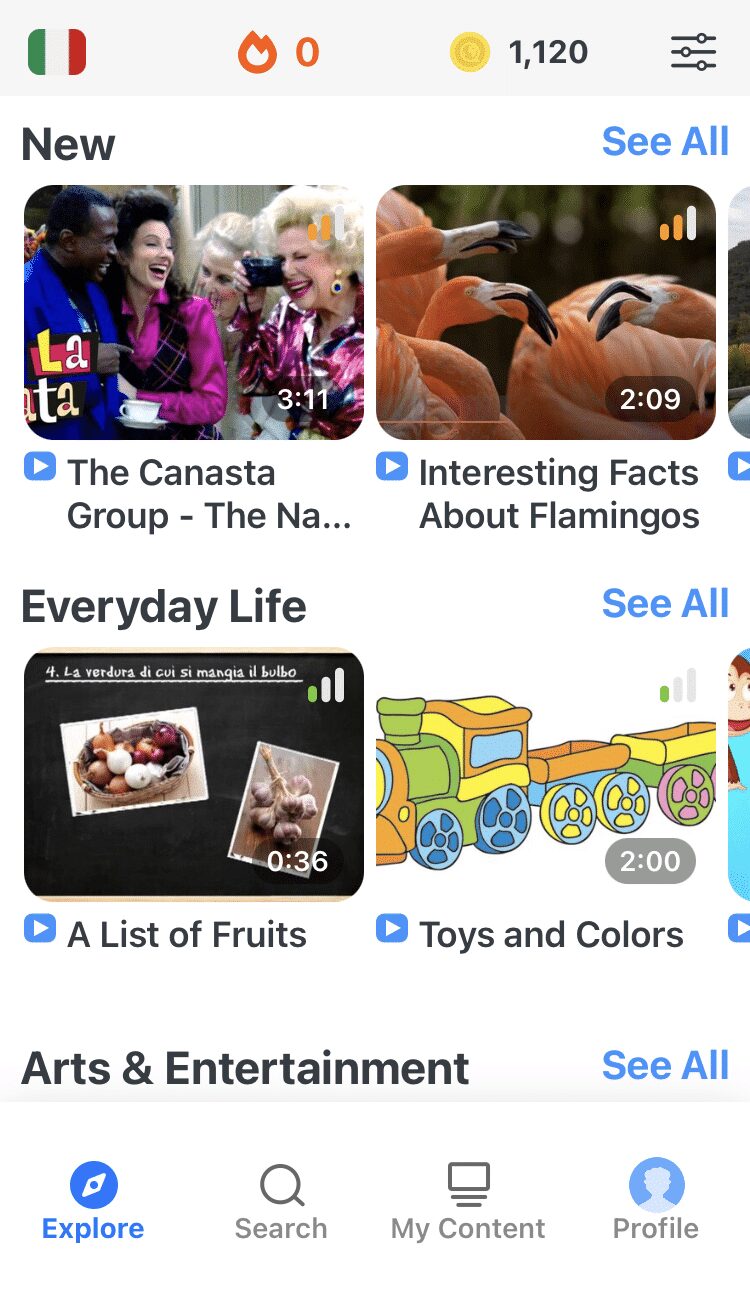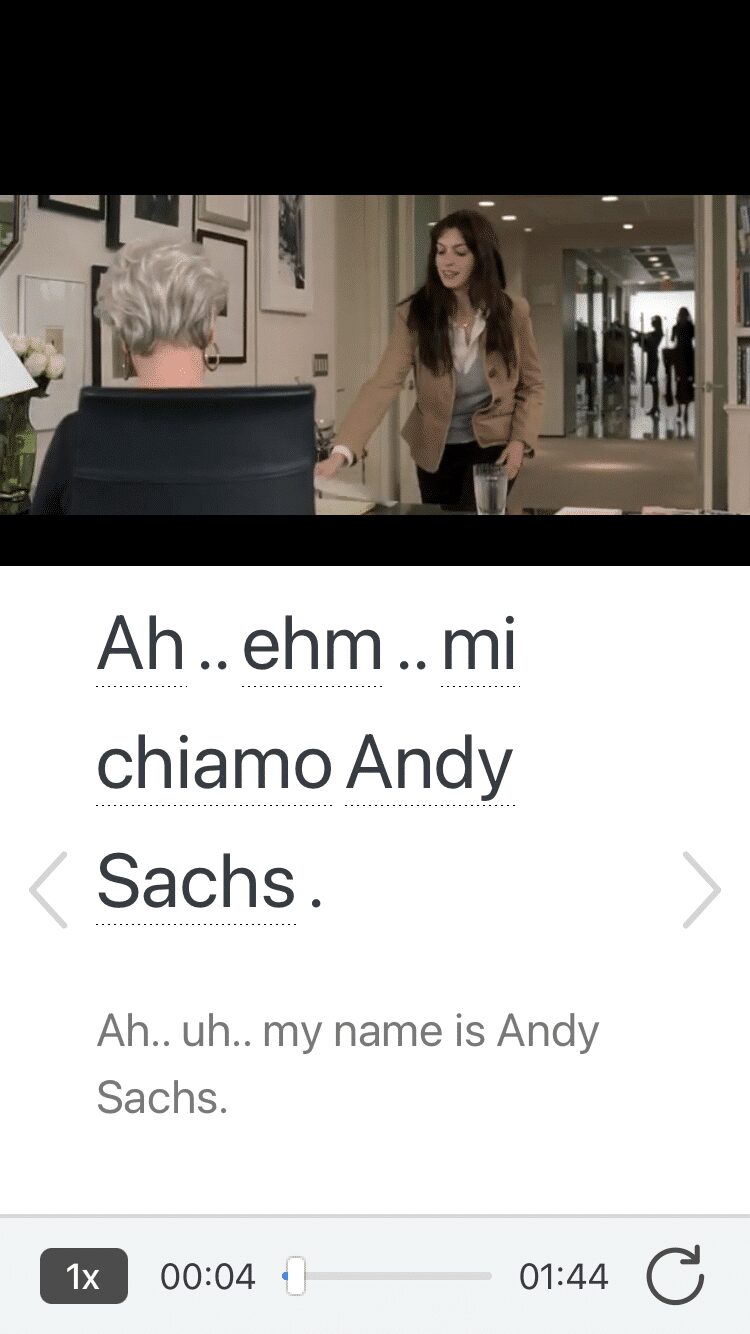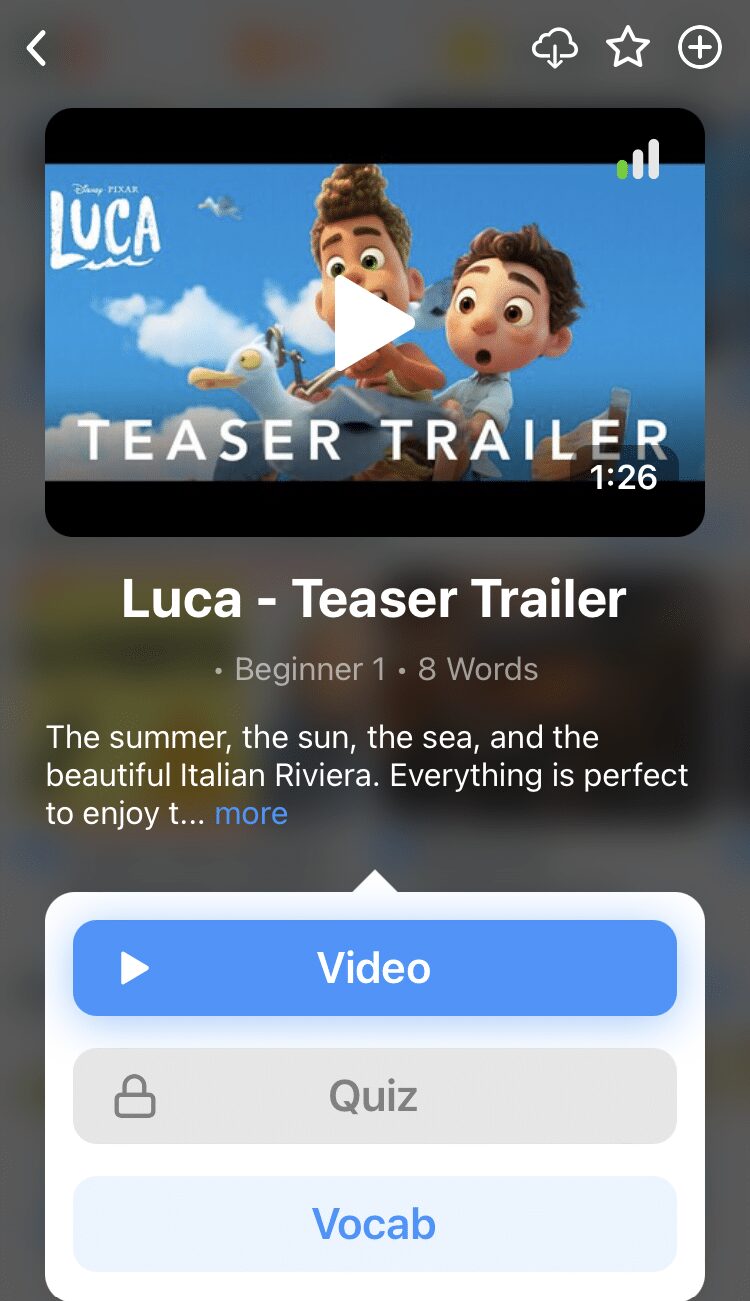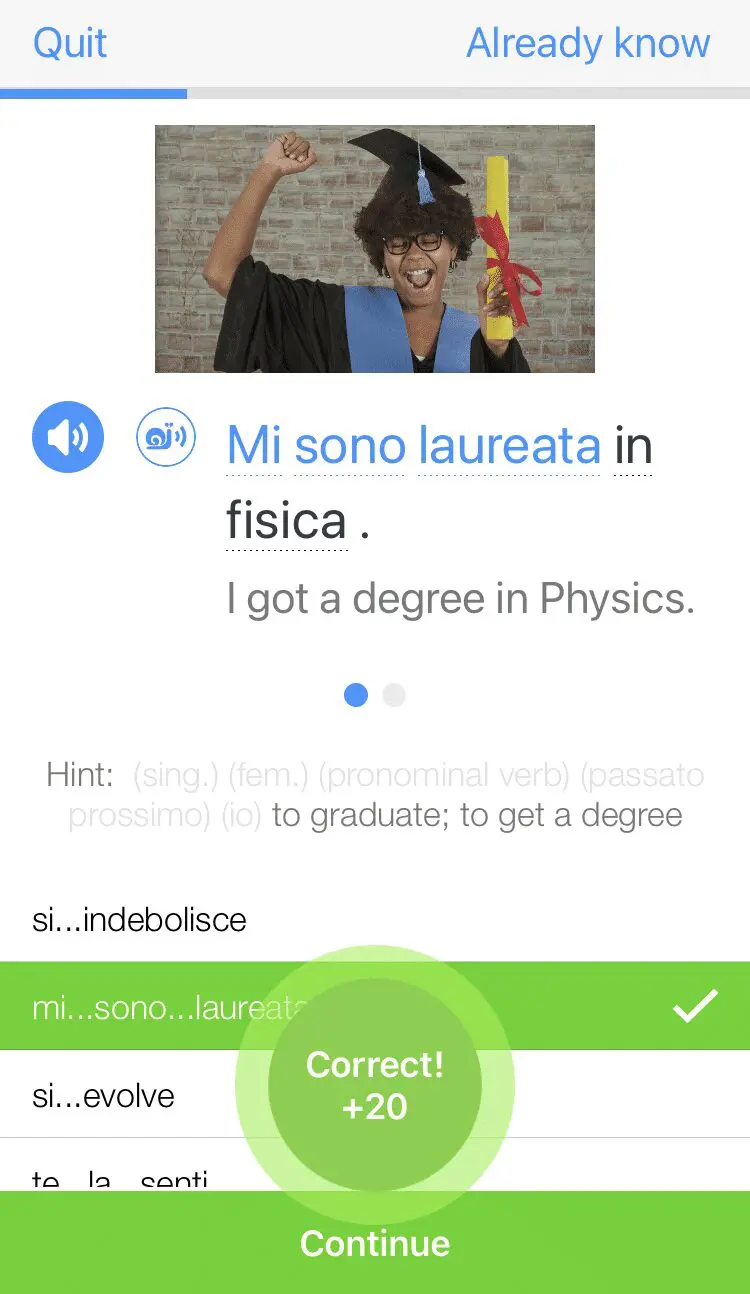Contents
- Most Common Ways to Say Goodbye in Italian
- Ciao (Bye)
- Arrivederci (Goodbye)
- A presto (See you soon)
- A dopo (Later)
- A domani (See you tomorrow)
- A tra poco (In a bit)
- Ci vediamo (See you)
- Alla prossima (Until next time)
- Fai il bravo (Be good)
- Addio (Farewell)
- Buona giornata / Buon pomeriggio / Buona serata (Have a nice day / Have a good afternoon / Have a nice evening)
- Buonanotte (Goodnight)
- Formal Ways to Say Goodbye in Italian
- Slang and Informal Ways to Say Goodbye in Italian
- Italian Farewell Phrases for Different Situations
- Italian Farewell Gestures and Etiquette
- Resources for Practicing How to Say Goodbye in Italian
- And One More Thing...
How to Say Goodbye in Italian: 50+ Phrases

Saying goodbye is no small feat at an Italian gathering. Kisses, back pats, cheek squeezes…and when all is said and done, it can take over 30 minutes to say goodbye to an intimate group of 10 people.
Italian is a language of social codes and the goodbye you’ll choose will depend on your company, the context and the formality required. Check out the 12 most common ways to say goodbye in Italian, plus a huge list of different formal and informal ways to say farewell.
Download: This blog post is available as a convenient and portable PDF that you can take anywhere. Click here to get a copy. (Download)
Most Common Ways to Say Goodbye in Italian
Ciao (Bye)
Ciao means “hello” and “goodbye” in Italian. It is an informal word and really should not be used with strangers. You can say ciao to your friends when you leave them at a bar or to your colleagues after a long day at work.
When leaving a group of friends or family members, you can also say Ciao a tutti (Bye, everyone).
You can also use ciao to end phone conversations with friends and family. For example, if you are ending a long phone call with your mother, you can say, Ciao, mamma! (Bye, mom!).
Arrivederci (Goodbye)
Arrivederci literally means “until we see each other again.”
It can sound slightly overdramatic in casual or familial situations. However, you can use it in formal or commercial settings.
For example, after finishing your espresso while standing up at an Italian bar, you can say (to nobody in particular), Grazie, arrivederci! (Thank you, goodbye!). It is most acceptable to say this at the bar where you have your daily espresso, as it means you will see the bar staff again.
However, if you were to use arrivederci in a familial context, it would be like saying “farewell” to your mother after stopping by her house to pick up some flour. Sure, it is grammatically correct, but it sounds strange in certain social situations.
A presto (See you soon)
Presto means “soon” or “early” in Italian. When you say a presto, it means “see you soon.” Italians take these salutations quite literally, so only use this phrase when you mean it.
For example, upon leaving work and saying goodbye to colleagues you will see again very soon, you could say, A presto!
A dopo (Later)
Dopo means “after” in Italian. When saying goodbye, a dopo means “later” as in “see you later.”
Only use this phrase if you actually intend to see the person later. Otherwise, it will confuse your audience. For example, if you call a friend to confirm plans to meet later in the day, you can say A dopo to end your call.
A domani (See you tomorrow)
Domani means “tomorrow” in Italian. A domani is used when you are sure that you will see the other person the next day, like “see you tomorrow” in English.
For example, at work, you could say Ciao, a domani (Bye, see you tomorrow) to your colleagues if you will see them the following day.
A tra poco (In a bit)
A tra poco means “in a bit.” It can be used fairly interchangeably with a dopo. Perhaps you are on your cell phone, running late to meet up with your friend. You can say, Sono quasi lì… a tra poco! (I am almost there… see you in a bit!).
Ci vediamo (See you)
Vedersi in this case is a reciprocal verb. Plus, you can also simply say ci vediamo when you are not sure when you’re going to see that person again. It can be translated as “see you around.”
Ci vediamo comes from the reciprocal verb vedersi (to see oneself). It literally means “we see each other” but can be translated as “see you around.” You can use it if you’re not sure when you’ll see the person again.
You can combine it with the phrases listed above to say:
Ci vediamo presto (See you soon)
Ci vediamo dopo (See you later)
Ci vediamo tra poco (See you in a bit)
The meaning does not change by adding ci vediamo in front of it.
Alla prossima (Until next time)
This is a fairly casual way to conclude a conversation with someone you see regularly. If you have a standing weekly tennis match with a friend, you might say, Alla prossima after ending your game.
Fai il bravo (Be good)
Bravo in Italian means “good.” Fare il bravo is the verb phrase for “to be good.” Parents often like to tell their children (even adult children) Fai il bravo! (Be good!) in place of a formal goodbye.
It is important to remember your audience when using this phrase. The gender of the audience determines how to use bravo.
- If you are speaking to one man, you say il bravo .
- If you are speaking to one woman, you say la brava .
- If you are speaking to a mix-gendered group, you say fate i bravi .
- If you are speaking to a group of women you say fate le brave .
It would be very unusual to use this somewhat playful form of goodbye with a superior. It would be like telling your boss, “Behave yourself” as she leaves for lunch.
Addio (Farewell)
Now, here is one dramatic word. Addio is for serious situations in which you will probably never see the person to whom you are speaking again. Similar to “farewell” in English, addio is a word that will make you sound like Scarlett O’Hara swanning around her antebellum mansion.
For example, if you are on a ship departing the port of Naples for the Americas, you may shout to your remaining family members, Addio, addio! You might even wave a handkerchief for an added flourish. You can also tell them you’ll miss them!
Buona giornata / Buon pomeriggio / Buona serata (Have a nice day / Have a good afternoon / Have a nice evening)
The most common way to bid a formal goodbye in Italian is to simply say buona giornata, buon pomeriggio or buona serata.
The time of day is important to consider when selecting which salutation to use. If it is before 2:00 p.m., you can say buona giornata. From around 2:00 p.m. to 5:00 p.m., you can say buon pomeriggio and after 5:00 p.m. you should say buona serata.
This is used in place of or in addition to arrivederci.
For example, if you have bought something from the local butcher, you may say upon exiting the store, Grazie, buona giornata (Thank you, have a nice day).
You may also use these phrases with your supervisor at work as she leaves for the evening, saying Arrivederci, buona serata (Goodbye, have a good evening).
Buonanotte (Goodnight)
Buonanotte is used when you are ready to relax and go to sleep, like “goodnight” in English.
You may also see buonanotte spelled as buona notte, like “goodnight” and “good night” in English. Both spellings are accepted when they are used as a farewell, although buonanotte is slightly more common than the latter.
Note that, when used as a noun instead of a farewell, e.g., dare la buonanotte (to say goodnight), it is always written as one word. For example: Volevo solo dare la buonanotte alla mia nonna (I just wanted to say goodnight to my grandma).
Buonanotte can also be shortened to ‘notte like “night” in English. For example: Notte, papà (Goodnight, Dad).
Formal Ways to Say Goodbye in Italian
If you’re in polite company, or you’re just not sure if you’re okay to use the informal with your companions, here are some more formal ways to say goodbye in Italian.
- Buon proseguimento — Have a nice continuation (enjoy the rest of the party/event/night/etc.)
- A più tardi — See you later
- Ci vediamo domani — See you tomorrow
- Ci risentiamo presto — We’ll be in touch soon
- Alla prossima volta — Until the next time
- Auguri e arrivederci — Best wishes and goodbye
- Salve — Hello/goodbye
- Mi scuso, devo andare — I apologize, I have to go
- Mi devo congedare — I have to take my leave
- Spero di rivederti presto — I hope to see you soon
- La ringrazio e arrivederci — Thank you and goodbye
- Grazie per tutto, arrivederci — Thank you for everything, goodbye
- È stato un piacere — It was a pleasure, goodbye
- La ringrazio per l’ospitalità, arrivederci — Thank you for your hospitality, goodbye
- Le auguro una buona giornata — I wish you a good day
Slang and Informal Ways to Say Goodbye in Italian
When among your friends, you can fall back on these informal and slangy Italian goodbyes.
- Cià — Bye (shortened version of “ciao”)
- Ciauz — Bye (slang variation of “ciao”)
- Ci vediamo — See you
- Ci si becca — See you around
- Ci si sente — Talk to you later
- Baci — Kisses
- Bacini — Little kisses
- Allora, ci si vede — Well then, see you around
- Basta così — That’s enough for now (Use this one in conjunction with another phrase. For example, you’ve just finished your work and you say Basta così, arrivederci a tutti, meaning “Enough, bye everyone.”)
- Fatti sentire — Get in touch
- Mi raccomando — Take care (literally “I recommend it to you”)
- Stammi bene — Take care of yourself
- In bocca al lupo — Good luck (literally “in the wolf’s mouth.” The traditional response is Crepi il lupo, meaning “May the wolf die.” However, nowadays people tend to avoid it and say instead viva il lupo, which means “long live the wolf.”)
- In culo alla balena — In the whale’s ass (a vulgar and humorous way of saying goodbye)
- Fatti vivo / Fatti viva — Stay in touch (literally “make yourself seen/heard”)
Italian Farewell Phrases for Different Situations
You don’t say the same goodbyes for a friend who’s leaving on a vacation trip as with a work friend who you’ll see tomorrow. Here are some farewells for different situations:
- Distinti saluti — Yours sincerely (used in written correspondence)
- Cordiali saluti — Best regards (used in written correspondence)
- Un caro saluto — Warm regards (used in written correspondence)
- In attesa di un vostro cortese riscontro — Looking forward to your kind reply (used in written correspondence)
- Ciao, Un bacio — Bye, a kiss (used over the phone)
- Buon lavoro — Have a nice day at work (used with colleagues)
- Buone vacanze — Have a good vacation
- Buon viaggio — Safe travels, or have a safe journey
- Buon fine settimana — Have a good weekend
Italian Farewell Gestures and Etiquette
Italian goodbyes have some etiquette associated with them. In most cases, a formal handshake or an informal hug may be used to bid people farewell.
Otherwise, you might be familiar with the goodbye kiss. It’s customary to give one or two light kisses on the cheek when saying goodbye to close friends or family members. The number of kisses may vary depending on the region, and in some areas, it can be more common among women or close acquaintances.
If you do go in for a kiss, remember this: left cheek first, then right cheek and finally ciao! If you mess up the order, you might end up accidentally kissing someone on the mouth!
Resources for Practicing How to Say Goodbye in Italian
Direct translations rarely get us very far when learning a new language and inhabiting a new culture. To say goodbye correctly and appropriately in Italian, it is best to observe native speakers in authentic contexts and then later mimic them in similar social situations.
It can be tempting to try to memorize all of these phrases, and there is no harm in trying. But again, the best way to learn and use these goodbye phrases correctly is to observe and imitate Italians in a myriad of situations.
FluentU is one way to see how natives use these phrases naturally.
FluentU takes authentic videos—like music videos, movie trailers, news and inspiring talks—and turns them into personalized language learning lessons.
You can try FluentU for free for 2 weeks. Check out the website or download the iOS app or Android app.
P.S. Click here to take advantage of our current sale! (Expires at the end of this month.)
There are also a ton of podcasts you can listen to—and you don’t need to speak fluent Italian to use them as a learning tool. Just listening to how the host interacts with guests and listeners will provide insight into common Italian goodbye words!
- The Coffee Break Italian podcast is a good place for beginners to start. It is an Italian language and culture podcast that offers lessons and dialogues. Episode one covers how to say hello and goodbye in Italian. And, all of the episodes can be useful when practicing salutations. Listen to and mimic the host as he greets and bids farewell to listeners.
- For more advanced learners, Podcast Italiano (Italian Podcast) provides fully immersive Italian episodes. The podcast is still geared toward learners, so while it is entirely in Italian, the cadence of the dialogue is slower. The hosts cover the latest news in Italian. Pay special attention to how they say goodbye at the conclusion of each short podcast. Make lists of expressions for goodbye that you hear.
- For the fluent or nearly fluent Italian speaker, Italiano Automatico Podcast (Automatic Italian Podcast) is an interview-style podcast that covers culture and grammar. The hosts provide learning and pronunciation tips in this advanced-level podcast that even native speakers can learn from. Write down the phrases you hear as the hosts bid guests and listeners goodbye.
Once you are thrust into a new social situation in Italy, the correct words for goodbye will come naturally, but practicing ahead of time always helps.
Just remember your audience and know that most goodbyes in Italy take forever!
Ciao a tutti! In bocca al lupo! (Goodbye, everyone! Good luck!)
Download: This blog post is available as a convenient and portable PDF that you can take anywhere. Click here to get a copy. (Download)
And One More Thing...
If you're as busy as most of us, you don't always have time for lengthy language lessons. The solution? FluentU!
Learn Italian with funny commericals, documentary excerpts and web series, as you can see here:

FluentU helps you get comfortable with everyday Italian by combining all the benefits of complete immersion and native-level conversations with interactive subtitles. Tap on any word to instantly see an image, in-context definition, example sentences and other videos in which the word is used.

Access a complete interactive transcript of every video under the Dialogue tab, and review words and phrases with convenient audio clips under Vocab.

Once you've watched a video, you can use FluentU's quizzes to actively practice all the vocabulary in that video. Swipe left or right to see more examples of the word you’re on.

FluentU will even keep track of all the Italian words you’re learning, and give you extra practice with difficult words. Plus, it'll tell you exactly when it's time for review. Now that's a 100% personalized experience!
The best part? You can try FluentU for free with a trial.
Start using the FluentU website on your computer or tablet or, better yet, download the FluentU app from the iTunes or Google Play store. Click here to take advantage of our current sale! (Expires at the end of this month.)








